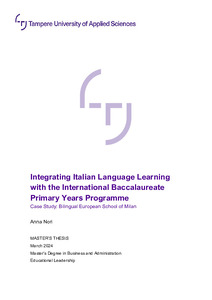Integrating Italian language learning with the International Baccalaureate Primary Years Programme : case study: Bilingual European School of Milan
Nori, Anna (2024)
Julkaisun pysyvä osoite on
https://urn.fi/URN:NBN:fi:amk-202404126390
https://urn.fi/URN:NBN:fi:amk-202404126390
Tiivistelmä
This thesis, commissioned by the Bilingual European School (BES) of Milan, aims to provide recommendations for the development of a curriculum for an Italian Enhanced Programme (EIP) tailored to primary schools following the International Baccalaureate Organization (IBO) and its Primary Years Programme (PYP). The study also investigates the most beneficial leadership approach for implementing and managing the EIP.
The research questions posed in this study aim to address key issues related to integrating language learning with the objectives of the PYP and identifying effective leadership strategies for successful program integration within schools. The case study focuses on the Bilingual European School of Milan, which offers a unique educational experience that combines the international perspective of the PYP with the Italian national curriculum.
The data were collected through phenomenological interviews and a journal, adopting an ecological paradigm and the principles of phenomenological philosophy and inspired by the phenomenological method.
The results showed that it is essential to align the EIP curriculum with the PYP objectives, focusing on language learning and planning a first phase to develop basic communication skills. Moreover, it suggests integrating suggestions of activities in the written curriculum, address the students’ variability, and promote the collaboration between classroom and course teachers.
The study identified problem solving and human resources management as crucial leadership aspects, emphasising the importance of effective communication, transparent decision making, collaboration, and investing on human resources.
The recommendations provided in this thesis can guide schools looking to implement similar language programs within the PYP framework.
The research questions posed in this study aim to address key issues related to integrating language learning with the objectives of the PYP and identifying effective leadership strategies for successful program integration within schools. The case study focuses on the Bilingual European School of Milan, which offers a unique educational experience that combines the international perspective of the PYP with the Italian national curriculum.
The data were collected through phenomenological interviews and a journal, adopting an ecological paradigm and the principles of phenomenological philosophy and inspired by the phenomenological method.
The results showed that it is essential to align the EIP curriculum with the PYP objectives, focusing on language learning and planning a first phase to develop basic communication skills. Moreover, it suggests integrating suggestions of activities in the written curriculum, address the students’ variability, and promote the collaboration between classroom and course teachers.
The study identified problem solving and human resources management as crucial leadership aspects, emphasising the importance of effective communication, transparent decision making, collaboration, and investing on human resources.
The recommendations provided in this thesis can guide schools looking to implement similar language programs within the PYP framework.
